Science
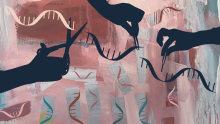
AT A SCIENTIFIC conference held in June, researchers from two U.S.-based biotech companies announced they had treated 44 patients suffering from beta thalassemia — a blood disorder, found primarily in Southeast Asia and Africa, that negatively impacts the production of hemoglobin and can lead to a shortened lifespan. In its most severe forms, frequent blood transfusions are needed. After the experimental treatment, 42 of those patients no longer needed any blood transfusions. Additionally, the companies reported treating 31 patients with sickle cell disease, which disproportionately impacts populations in sub-Saharan Africa, as well as approximately 100,000 Americans. After treatment, none of these patients continued to have the recurrent painful symptoms that often lead to hospitalization.
All these patients were treated with an innovative approach that depended on the gene-editing technology CRISPR (Clustered Regularly Interspaced Short Palindromic Repeats). In the coming months, the companies CRISPR Therapeutics and Vertex Pharmaceuticals will submit these treatments for regulatory approvals in Europe and the U.K.
As people of faith, what do we need to know about CRISPR, and how might Christians respond to its ethical challenges?

On June 20, a rocket is scheduled to blast off from NASA’s Wallops Flight Facility in Virginia, USA, carrying a precious cargo: a solar cell science project from Nestor Epinayu, 16, and his fellow science club members from a small indigenous community in Colombia. More than just a children's science project, solar energy plays a huge role in bringing electricity to this community in La Guajira, on the border with Venezuela.

It’s a magical experience watching fireflies rise from the ground at dusk and blink their way high into the trees, performing their light show against the night sky. When I learned the science behind how the bugs make their light — a process called bioluminescence — it didn’t make them any less magical to me. Rather, my new insights made me appreciate them more.
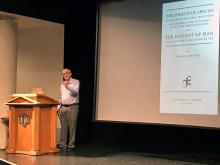
The lecture March 5 by the founder of the Ark Encounter — a $102 million, 800-acre Noah’s Ark theme park that opened in Williamstown, Ky., two years ago — came weeks after the university’s student government association rescinded an invitation for Ham to speak on campus. Some students, who deem Ham homophobic, objected to student funds being used to bring him to campus.

News that scientists for the first time successfully edited genes in human embryos created a stir this week. In the experiment, outlined in a paper in the journal Nature published Wednesday, scientists essentially snipped a mutant gene known to cause a heart condition that can lead to sudden death.

After a quarter-century, the Rev. Barry Lynn is retiring as head of Americans United for Separation of Church and State.
In court, in congressional hearings, and on cable television, Lynn has led the fight against school-sponsored prayer, religious symbols on public property, and any law that allows government to privilege people of faith.

To tell a Christian story about environmental care, we must redefine Christian stewardship. For a movement to attach Christ’s name to it, it must embody the spirit of Jesus as one who gave away his power. Christian stewardship, then, is not dominating with power, but yielding with care. First, we must listen to what the natural world is telling us and respond to it accordingly, not only because we ought to be tenderhearted people, but because it ensures our mutual flourishing
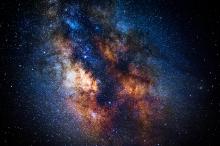
Throughout the history of theology, Mix said, Christians have swung between the idea that Earth can be the only inhabited planet because God favors humans, and its counterpart, that to assume Earth is the only inhabited planet is the height of human pride because God is limitless and all-powerful.

A decade ago, a critic accused me of writing a book about a “nonexistent” threat from the religious right. One reviewer called my work a “paranoid rant,” while another detractor wrote my “alarmist” views were “exaggerated and implausible.”
In The Baptizing of America: The Religious Right’s Plans For The Rest Of Us, published in 2006, I had warned that a well-financed and highly organized group of religious and political leaders was seeking to impose their narrow extremist beliefs and harsh public policies on the United States, even as our nation’s population was increasingly multireligious, multiethnic, and multiracial.

Hidden Figures is a perfectly okay film in the feel-good crowd pleaser mold. But as important as the stories of these three often overlooked women are, it feels as if not enough time, effort, or vision were really put into the film to make it stand out. It’s not a movie that will offend anyone’s sensibilities. But it’s unlikely that audiences will be able to recall anything significant about it a year from now. These extraordinary women deserve better.

Science and education professionals are increasingly alarmed about the impact Donald Trump’s cabinet picks — many of them evangelical Christians — could have on science standards in public schools.
Candidate Trump repeatedly pledged to end the existing Common Core curricula standards for math and English. Critics worry that could open the door to rethinking science standards, and lead to the teaching of creationism and Intelligent Design, pseudo-scientific notions about Earth’s origins with little or no support from scientists.
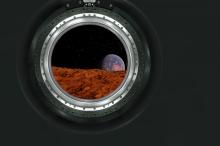
There’s nothing wrong with celebrating human ingenuity and determination, but the approach here is simplistic. It may well be true that settlements on Mars are the only hope for our species to continue, and should humanity pursue this course, acts of heroism may well be required. But going about this endeavor the right way must involve a healthy dose of self-reflection, and in this regard Mars has missed an opportunity. For one thing, despite the message that expansion to Mars is imperative for the survival of the human race, there is no discussion of the human contribution to our planet’s eventual uninhabitability. It’s possible that Earth could be hit by a sizable asteroid, or that a super volcano could erupt, but anthropogenic climate change and nuclear warfare pose far greater threats to our flourishing over the next few centuries. If we are going to switch planets in order to save ourselves, we can’t ignore the fact that we bring our destructive power with us.

Thank God for the internet.
If you believe in God, that is. For a time, Mike McHargue did, and then he didn’t, and now he does again.
But it’s on the internet where McHargue — better known as “Science Mike” to listeners of “The Liturgists” and “ Ask Science Mike” podcasts — found community when he was questioning his Southern Baptist upbringing and then the atheism he had adopted. And it’s on the internet where he’s forged a community with others like him who can’t comfortably wear either label: Christian or atheist.

Long said that in her own experience, transgender scientists are sometimes called by incorrect gender pronouns and or not allowed to formally change their names in scientific publications.
To Dr. Ramon Barthelemy, a science policy fellow at AAAS, LGBTQ physicist, and co-author of the study, not being able to change a professional publication record is especially problematic in the sciences.

Creationist Christian tourists may soon flock to the Ark Encounter, a literal vision of Noah’s story in Genesis come to life in July as a theology-packed tourist attraction in Williamstown, Ky.

[Editor's note: This article is excerpted from Stars Beneath Us: Finding God in the Evolving Cosmos by Paul Wallace copyright (c) 2016 Fortress Press. Reproduced by permission of Augsburg Fortress. No further reproduction allowed without the written permission of Augsburg Fortress.]
WHAT ARE WE to do with an obsolete God?
We have options. We could, as I did for a while, put God aside. ... We can try, but I’m pretty sure that God is the question that won’t go away. Silence it here and it will pop up over there. It may show up as worship of science, or the economy, or a political cause, or ego, or an addiction, or sex, or a fellow human being—or whatever, but show up it will. Some humanists and atheists have expressed contempt for religious believers’ worship of God. They ask, Why worship anything at all? One online interlocutor once asked me, “How can you put the word ‘worship’ on your signs? Isn’t that demeaning?” I replied, “No, it is truth in advertising. We all worship something.” I am convinced that not all worship is true worship, but I am equally convinced that religious believers at least acknowledge that worship is simply what all people, religious and otherwise, do. There’s nothing for it but to accept it and make the best of it.
We could also try to build a new God out of the raw materials of science itself. It’s hard to disagree with Ralph Waldo Emerson when he writes, “Nothing is great but the inexhaustible wealth of nature. She shows us only some surfaces, but she is a million fathoms deep.” Isn’t the cosmos astounding, and isn’t the wonder it stirs in us something akin to a religious feeling? Yes and yes. Without such feelings there would be no religion at all. But are such feelings enough? Is the mind-blowing order and complexity and diversity and beauty of the cosmos sufficient to slake our religious thirst? For some it may be and I can nearly, but not quite, imagine how it could be enough for me.
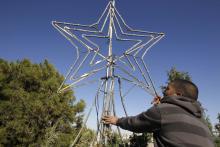
The Star of Bethlehem is the name given to an event in the night sky that the Gospel of Matthew says heralded the birth of Jesus. Three wisemen — or magi, or kings — come to King Herod and ask, “Where is the one who has been born king of the Jews? We saw his star in the east and have come to worship him.”
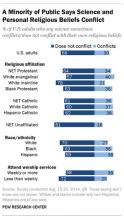
Most Americans see a conflict between the findings of science and the teachings of religion.
But “see” is the operative word in a new Pew Research Center report issued Oct. 22.
Examining perceptions leads to some unexpected findings.
While 59 percent of U.S. adults say they saw science and religion in conflict, that drops to 30 percent when people are asked about their own religious beliefs.
It turns out that the most highly religious were least likely to see conflict.
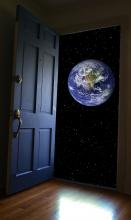
The universe is made up of 96 percent dark matter and energy, swirling with complexity — black holes, empty spaces, bad dreams, failed marriages, unknown territory, broken bowls and bruised shins and loneliness. And yet — look! — everything is still churning along. And in a way that can only be explained in the gut, these alarming dark things are perhaps the only things that have the tendency of bringing people together into community.
As Jean Vanier, founder of L’Arche writes, “In community life we discover our own deepest wound and learn to accept it. So our rebirth can begin. It is from this very wound that we are born.”
